The Role of Knowledge Management in UK Retail: Sainsbury vs Tesco
VerifiedAdded on 2019/12/03
|29
|7020
|496
Report
AI Summary
This report investigates the role of Knowledge Management (KM) in the UK retail sector, focusing on a comparative analysis between Sainsbury and Tesco. The study aims to understand the meaning and significance of KM within the retail context, comparing KM practices, analyzing their impact on business performance, and identifying best practices. The research explores the importance of KM in addressing challenges related to customer needs and data management, emphasizing its role in decision-making, employee motivation, and operational efficiency. The literature review defines KM as a multidisciplinary approach to leveraging acquired knowledge for organizational objectives, highlighting its significance for retail, including enhanced customer service and strategic planning. The methodology employs a positivism philosophy and an inductive approach, analyzing data to draw specific conclusions about the KM practices of Sainsbury and Tesco. The report's findings and recommendations aim to provide insights into effective KM strategies for UK retail organizations. The report also contains an executive summary, table of contents, literature review, research methodology, data analysis, conclusion, recommendations, reflective section, references, and appendices.
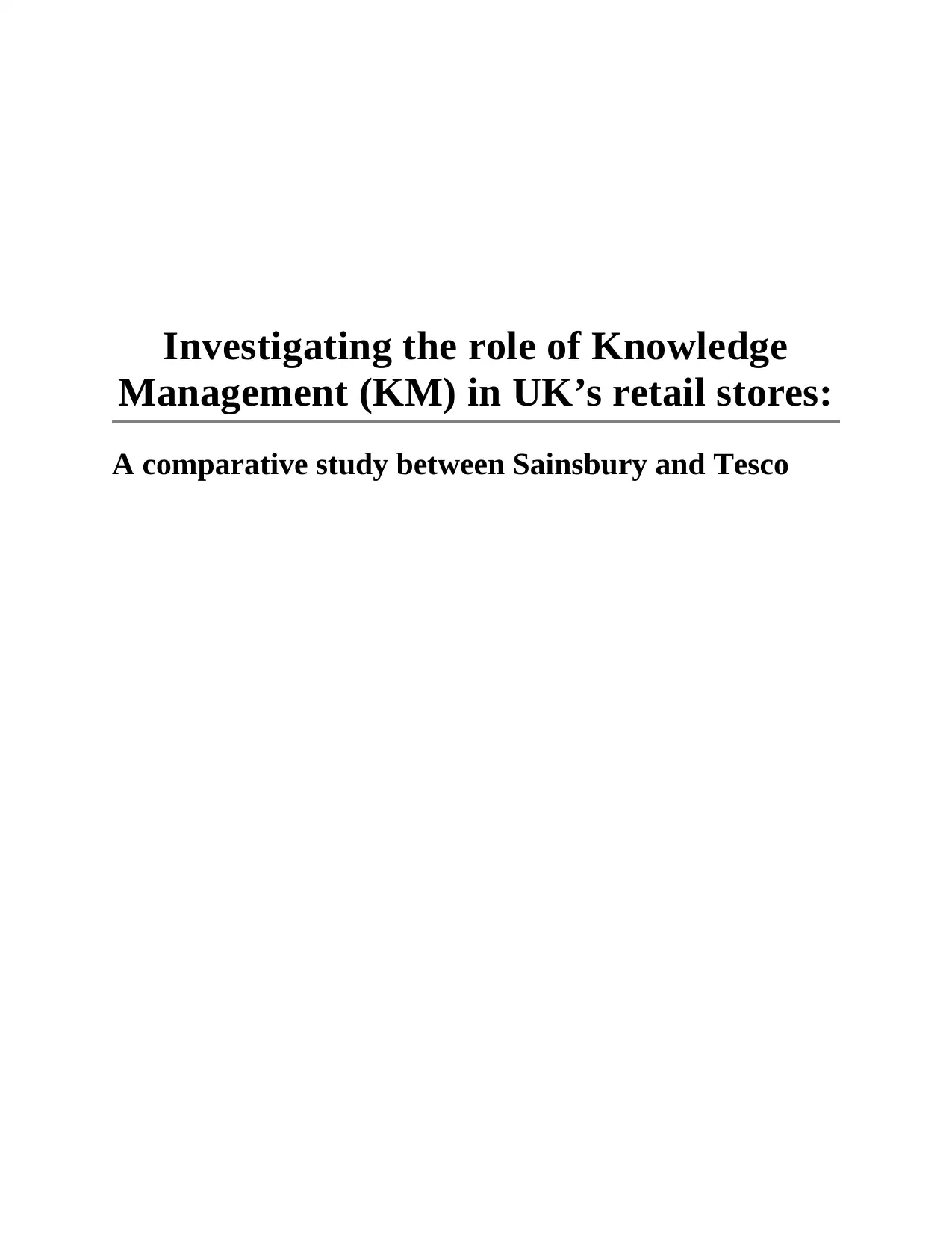
Investigating the role of Knowledge
Management (KM) in UK’s retail stores:
A comparative study between Sainsbury and Tesco
Management (KM) in UK’s retail stores:
A comparative study between Sainsbury and Tesco
Paraphrase This Document
Need a fresh take? Get an instant paraphrase of this document with our AI Paraphraser
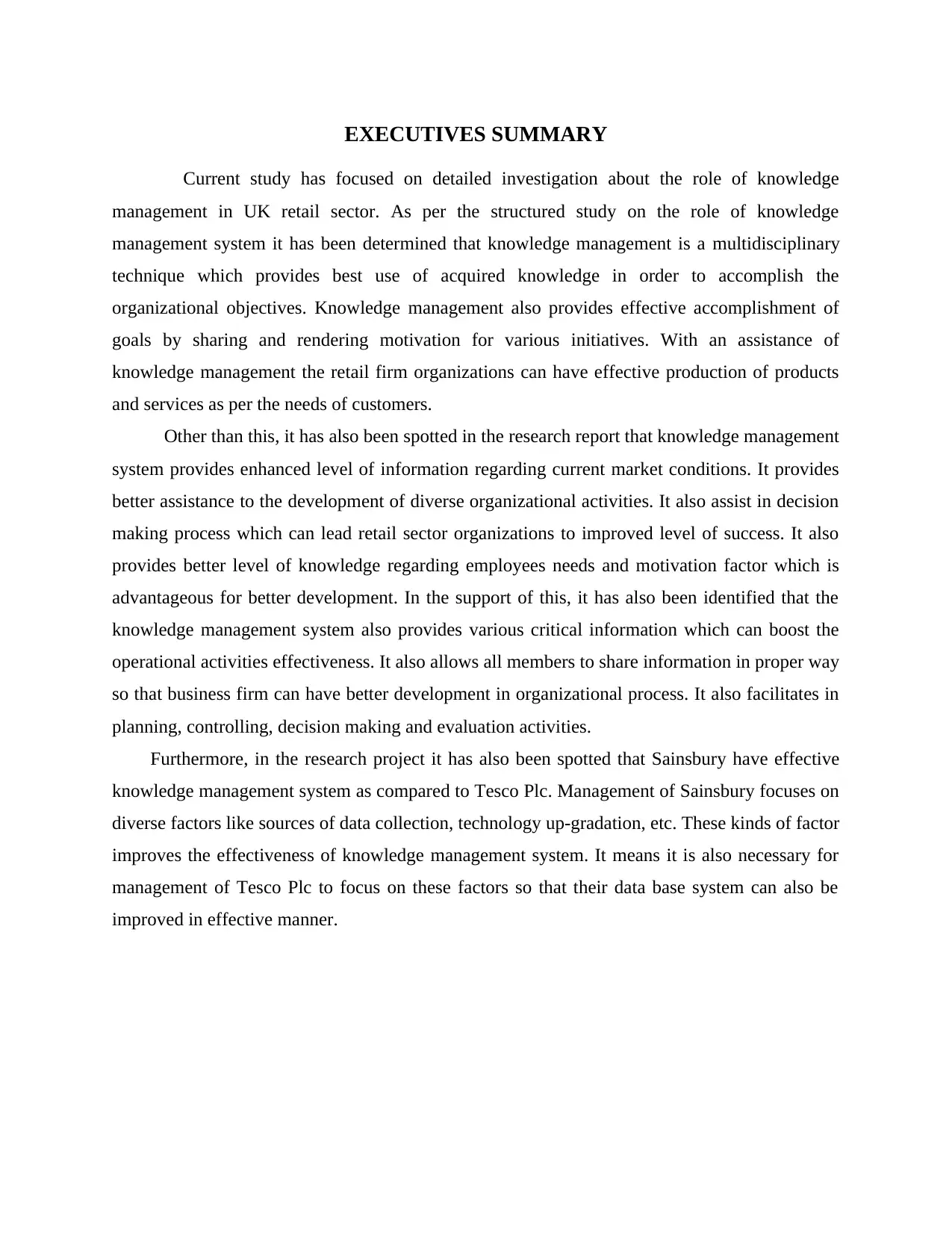
EXECUTIVES SUMMARY
Current study has focused on detailed investigation about the role of knowledge
management in UK retail sector. As per the structured study on the role of knowledge
management system it has been determined that knowledge management is a multidisciplinary
technique which provides best use of acquired knowledge in order to accomplish the
organizational objectives. Knowledge management also provides effective accomplishment of
goals by sharing and rendering motivation for various initiatives. With an assistance of
knowledge management the retail firm organizations can have effective production of products
and services as per the needs of customers.
Other than this, it has also been spotted in the research report that knowledge management
system provides enhanced level of information regarding current market conditions. It provides
better assistance to the development of diverse organizational activities. It also assist in decision
making process which can lead retail sector organizations to improved level of success. It also
provides better level of knowledge regarding employees needs and motivation factor which is
advantageous for better development. In the support of this, it has also been identified that the
knowledge management system also provides various critical information which can boost the
operational activities effectiveness. It also allows all members to share information in proper way
so that business firm can have better development in organizational process. It also facilitates in
planning, controlling, decision making and evaluation activities.
Furthermore, in the research project it has also been spotted that Sainsbury have effective
knowledge management system as compared to Tesco Plc. Management of Sainsbury focuses on
diverse factors like sources of data collection, technology up-gradation, etc. These kinds of factor
improves the effectiveness of knowledge management system. It means it is also necessary for
management of Tesco Plc to focus on these factors so that their data base system can also be
improved in effective manner.
Current study has focused on detailed investigation about the role of knowledge
management in UK retail sector. As per the structured study on the role of knowledge
management system it has been determined that knowledge management is a multidisciplinary
technique which provides best use of acquired knowledge in order to accomplish the
organizational objectives. Knowledge management also provides effective accomplishment of
goals by sharing and rendering motivation for various initiatives. With an assistance of
knowledge management the retail firm organizations can have effective production of products
and services as per the needs of customers.
Other than this, it has also been spotted in the research report that knowledge management
system provides enhanced level of information regarding current market conditions. It provides
better assistance to the development of diverse organizational activities. It also assist in decision
making process which can lead retail sector organizations to improved level of success. It also
provides better level of knowledge regarding employees needs and motivation factor which is
advantageous for better development. In the support of this, it has also been identified that the
knowledge management system also provides various critical information which can boost the
operational activities effectiveness. It also allows all members to share information in proper way
so that business firm can have better development in organizational process. It also facilitates in
planning, controlling, decision making and evaluation activities.
Furthermore, in the research project it has also been spotted that Sainsbury have effective
knowledge management system as compared to Tesco Plc. Management of Sainsbury focuses on
diverse factors like sources of data collection, technology up-gradation, etc. These kinds of factor
improves the effectiveness of knowledge management system. It means it is also necessary for
management of Tesco Plc to focus on these factors so that their data base system can also be
improved in effective manner.
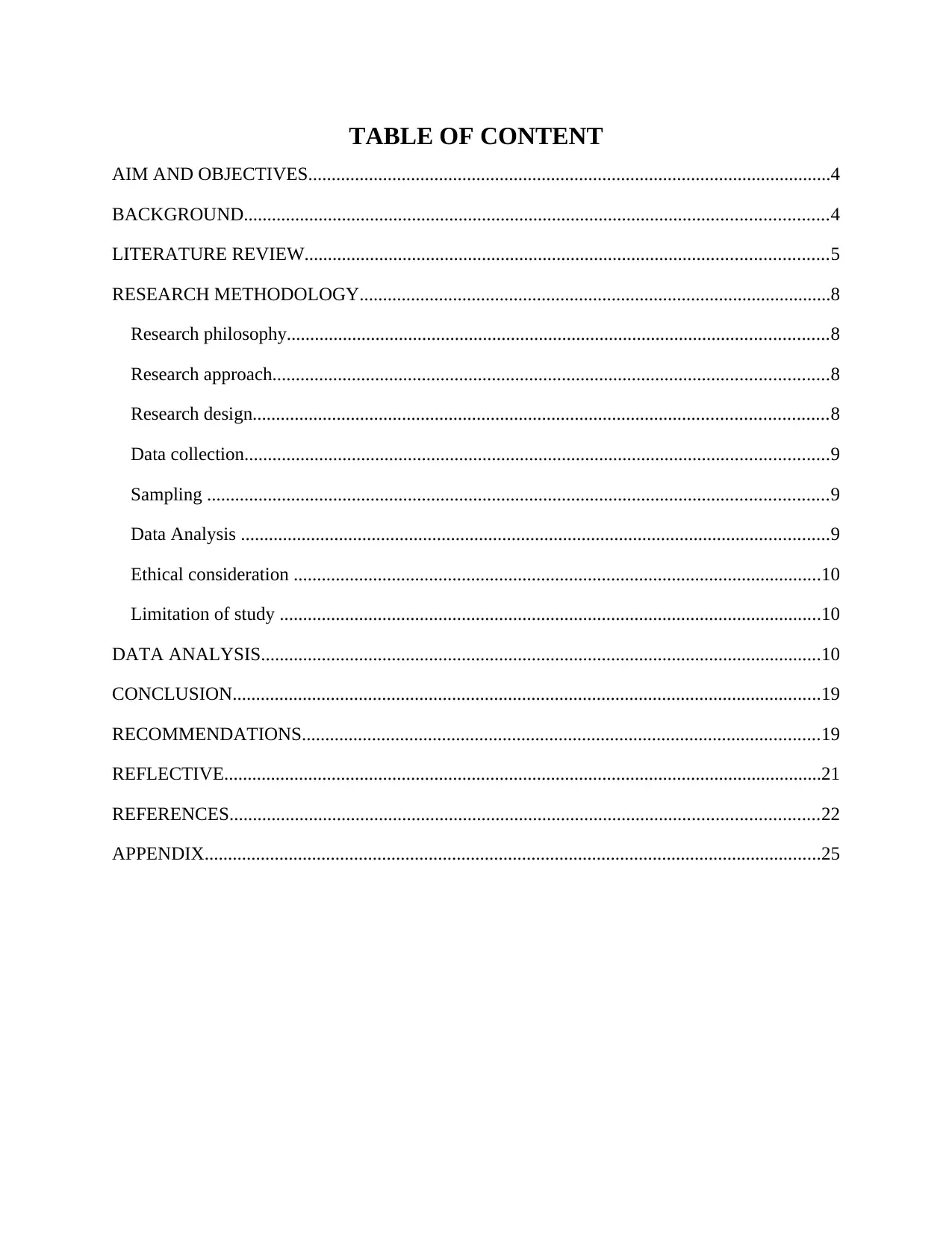
TABLE OF CONTENT
AIM AND OBJECTIVES................................................................................................................4
BACKGROUND.............................................................................................................................4
LITERATURE REVIEW................................................................................................................5
RESEARCH METHODOLOGY.....................................................................................................8
Research philosophy....................................................................................................................8
Research approach.......................................................................................................................8
Research design...........................................................................................................................8
Data collection.............................................................................................................................9
Sampling .....................................................................................................................................9
Data Analysis ..............................................................................................................................9
Ethical consideration .................................................................................................................10
Limitation of study ....................................................................................................................10
DATA ANALYSIS........................................................................................................................10
CONCLUSION..............................................................................................................................19
RECOMMENDATIONS...............................................................................................................19
REFLECTIVE................................................................................................................................21
REFERENCES..............................................................................................................................22
APPENDIX....................................................................................................................................25
AIM AND OBJECTIVES................................................................................................................4
BACKGROUND.............................................................................................................................4
LITERATURE REVIEW................................................................................................................5
RESEARCH METHODOLOGY.....................................................................................................8
Research philosophy....................................................................................................................8
Research approach.......................................................................................................................8
Research design...........................................................................................................................8
Data collection.............................................................................................................................9
Sampling .....................................................................................................................................9
Data Analysis ..............................................................................................................................9
Ethical consideration .................................................................................................................10
Limitation of study ....................................................................................................................10
DATA ANALYSIS........................................................................................................................10
CONCLUSION..............................................................................................................................19
RECOMMENDATIONS...............................................................................................................19
REFLECTIVE................................................................................................................................21
REFERENCES..............................................................................................................................22
APPENDIX....................................................................................................................................25
⊘ This is a preview!⊘
Do you want full access?
Subscribe today to unlock all pages.

Trusted by 1+ million students worldwide
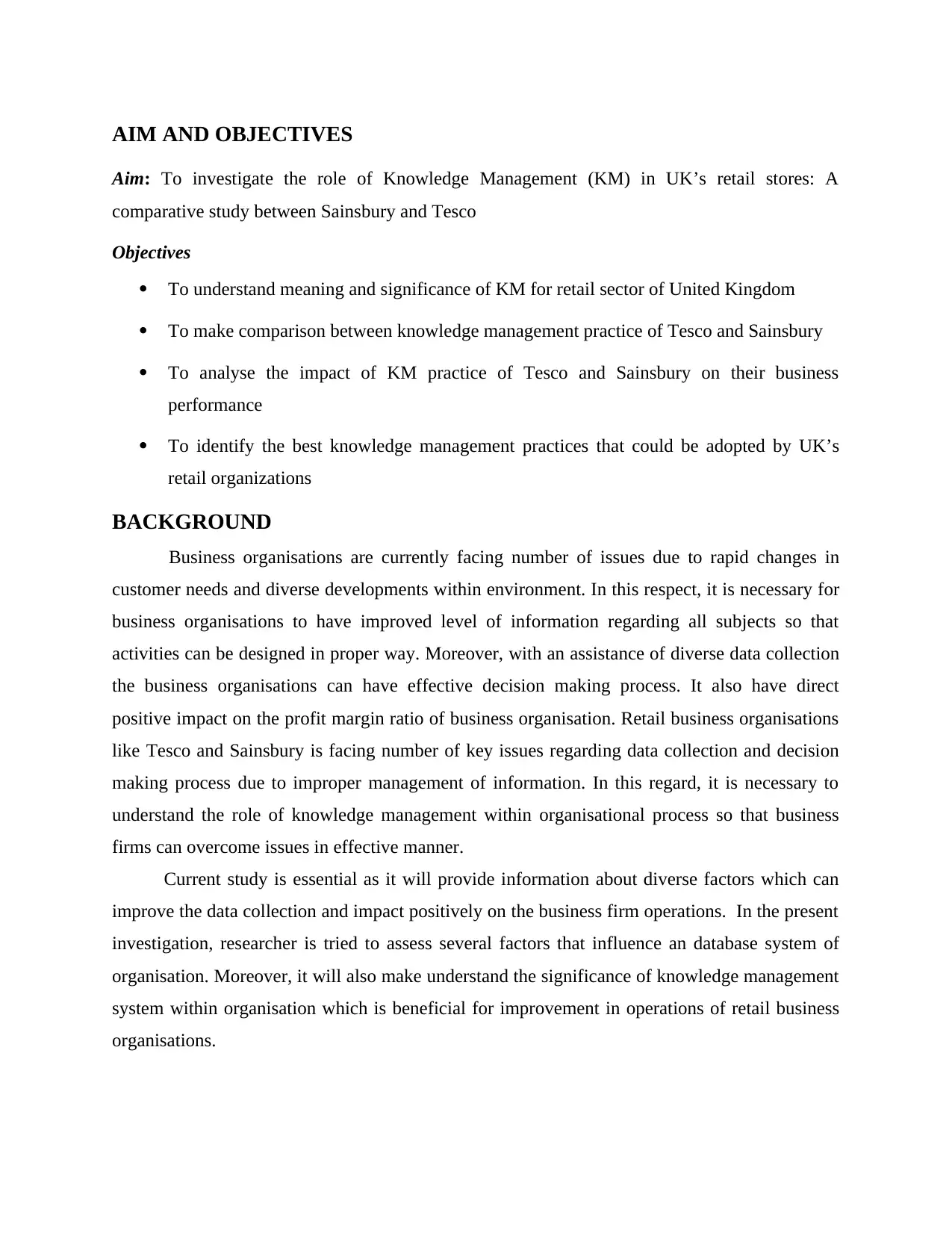
AIM AND OBJECTIVES
Aim: To investigate the role of Knowledge Management (KM) in UK’s retail stores: A
comparative study between Sainsbury and Tesco
Objectives
To understand meaning and significance of KM for retail sector of United Kingdom
To make comparison between knowledge management practice of Tesco and Sainsbury
To analyse the impact of KM practice of Tesco and Sainsbury on their business
performance
To identify the best knowledge management practices that could be adopted by UK’s
retail organizations
BACKGROUND
Business organisations are currently facing number of issues due to rapid changes in
customer needs and diverse developments within environment. In this respect, it is necessary for
business organisations to have improved level of information regarding all subjects so that
activities can be designed in proper way. Moreover, with an assistance of diverse data collection
the business organisations can have effective decision making process. It also have direct
positive impact on the profit margin ratio of business organisation. Retail business organisations
like Tesco and Sainsbury is facing number of key issues regarding data collection and decision
making process due to improper management of information. In this regard, it is necessary to
understand the role of knowledge management within organisational process so that business
firms can overcome issues in effective manner.
Current study is essential as it will provide information about diverse factors which can
improve the data collection and impact positively on the business firm operations. In the present
investigation, researcher is tried to assess several factors that influence an database system of
organisation. Moreover, it will also make understand the significance of knowledge management
system within organisation which is beneficial for improvement in operations of retail business
organisations.
Aim: To investigate the role of Knowledge Management (KM) in UK’s retail stores: A
comparative study between Sainsbury and Tesco
Objectives
To understand meaning and significance of KM for retail sector of United Kingdom
To make comparison between knowledge management practice of Tesco and Sainsbury
To analyse the impact of KM practice of Tesco and Sainsbury on their business
performance
To identify the best knowledge management practices that could be adopted by UK’s
retail organizations
BACKGROUND
Business organisations are currently facing number of issues due to rapid changes in
customer needs and diverse developments within environment. In this respect, it is necessary for
business organisations to have improved level of information regarding all subjects so that
activities can be designed in proper way. Moreover, with an assistance of diverse data collection
the business organisations can have effective decision making process. It also have direct
positive impact on the profit margin ratio of business organisation. Retail business organisations
like Tesco and Sainsbury is facing number of key issues regarding data collection and decision
making process due to improper management of information. In this regard, it is necessary to
understand the role of knowledge management within organisational process so that business
firms can overcome issues in effective manner.
Current study is essential as it will provide information about diverse factors which can
improve the data collection and impact positively on the business firm operations. In the present
investigation, researcher is tried to assess several factors that influence an database system of
organisation. Moreover, it will also make understand the significance of knowledge management
system within organisation which is beneficial for improvement in operations of retail business
organisations.
Paraphrase This Document
Need a fresh take? Get an instant paraphrase of this document with our AI Paraphraser
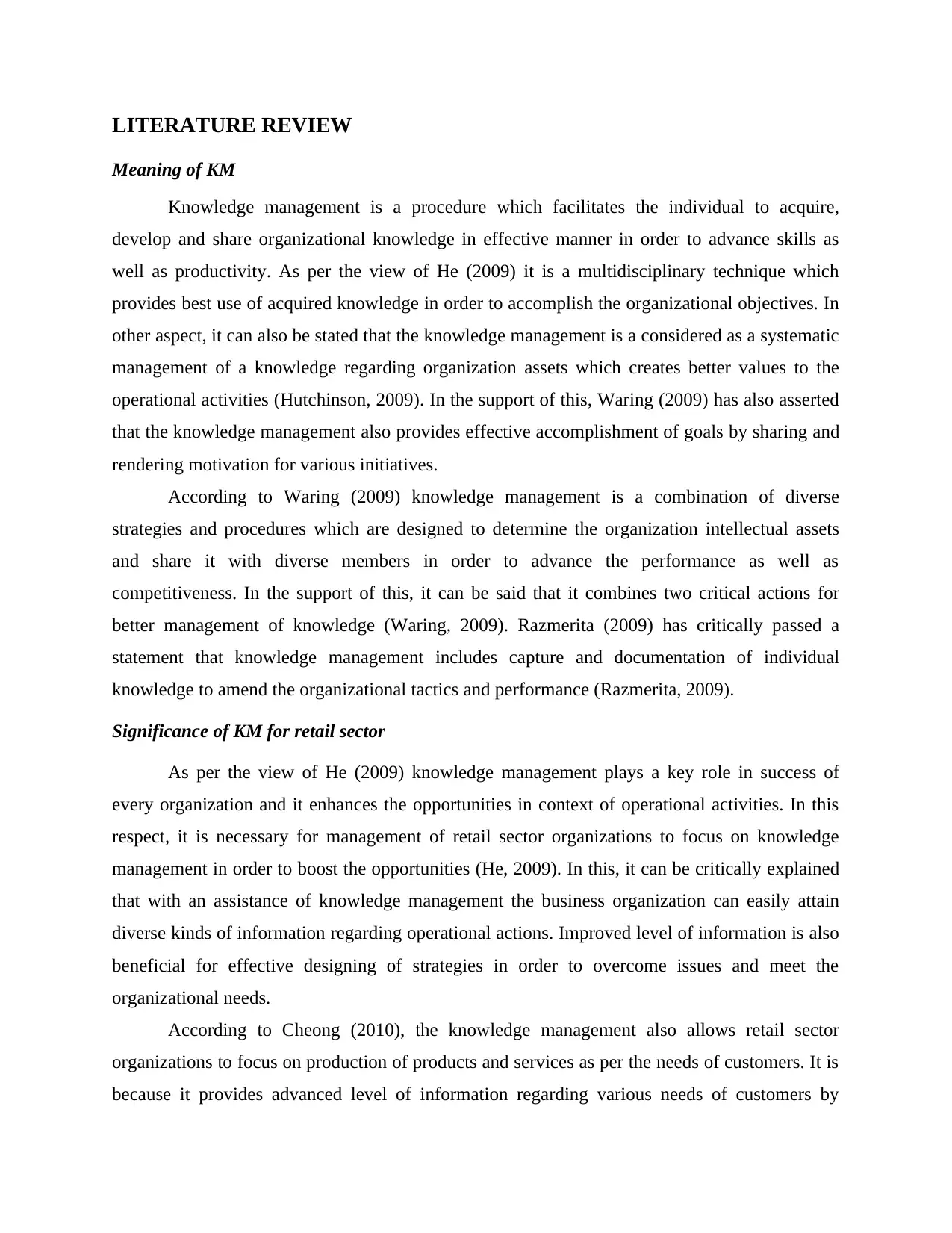
LITERATURE REVIEW
Meaning of KM
Knowledge management is a procedure which facilitates the individual to acquire,
develop and share organizational knowledge in effective manner in order to advance skills as
well as productivity. As per the view of He (2009) it is a multidisciplinary technique which
provides best use of acquired knowledge in order to accomplish the organizational objectives. In
other aspect, it can also be stated that the knowledge management is a considered as a systematic
management of a knowledge regarding organization assets which creates better values to the
operational activities (Hutchinson, 2009). In the support of this, Waring (2009) has also asserted
that the knowledge management also provides effective accomplishment of goals by sharing and
rendering motivation for various initiatives.
According to Waring (2009) knowledge management is a combination of diverse
strategies and procedures which are designed to determine the organization intellectual assets
and share it with diverse members in order to advance the performance as well as
competitiveness. In the support of this, it can be said that it combines two critical actions for
better management of knowledge (Waring, 2009). Razmerita (2009) has critically passed a
statement that knowledge management includes capture and documentation of individual
knowledge to amend the organizational tactics and performance (Razmerita, 2009).
Significance of KM for retail sector
As per the view of He (2009) knowledge management plays a key role in success of
every organization and it enhances the opportunities in context of operational activities. In this
respect, it is necessary for management of retail sector organizations to focus on knowledge
management in order to boost the opportunities (He, 2009). In this, it can be critically explained
that with an assistance of knowledge management the business organization can easily attain
diverse kinds of information regarding operational actions. Improved level of information is also
beneficial for effective designing of strategies in order to overcome issues and meet the
organizational needs.
According to Cheong (2010), the knowledge management also allows retail sector
organizations to focus on production of products and services as per the needs of customers. It is
because it provides advanced level of information regarding various needs of customers by
Meaning of KM
Knowledge management is a procedure which facilitates the individual to acquire,
develop and share organizational knowledge in effective manner in order to advance skills as
well as productivity. As per the view of He (2009) it is a multidisciplinary technique which
provides best use of acquired knowledge in order to accomplish the organizational objectives. In
other aspect, it can also be stated that the knowledge management is a considered as a systematic
management of a knowledge regarding organization assets which creates better values to the
operational activities (Hutchinson, 2009). In the support of this, Waring (2009) has also asserted
that the knowledge management also provides effective accomplishment of goals by sharing and
rendering motivation for various initiatives.
According to Waring (2009) knowledge management is a combination of diverse
strategies and procedures which are designed to determine the organization intellectual assets
and share it with diverse members in order to advance the performance as well as
competitiveness. In the support of this, it can be said that it combines two critical actions for
better management of knowledge (Waring, 2009). Razmerita (2009) has critically passed a
statement that knowledge management includes capture and documentation of individual
knowledge to amend the organizational tactics and performance (Razmerita, 2009).
Significance of KM for retail sector
As per the view of He (2009) knowledge management plays a key role in success of
every organization and it enhances the opportunities in context of operational activities. In this
respect, it is necessary for management of retail sector organizations to focus on knowledge
management in order to boost the opportunities (He, 2009). In this, it can be critically explained
that with an assistance of knowledge management the business organization can easily attain
diverse kinds of information regarding operational actions. Improved level of information is also
beneficial for effective designing of strategies in order to overcome issues and meet the
organizational needs.
According to Cheong (2010), the knowledge management also allows retail sector
organizations to focus on production of products and services as per the needs of customers. It is
because it provides advanced level of information regarding various needs of customers by
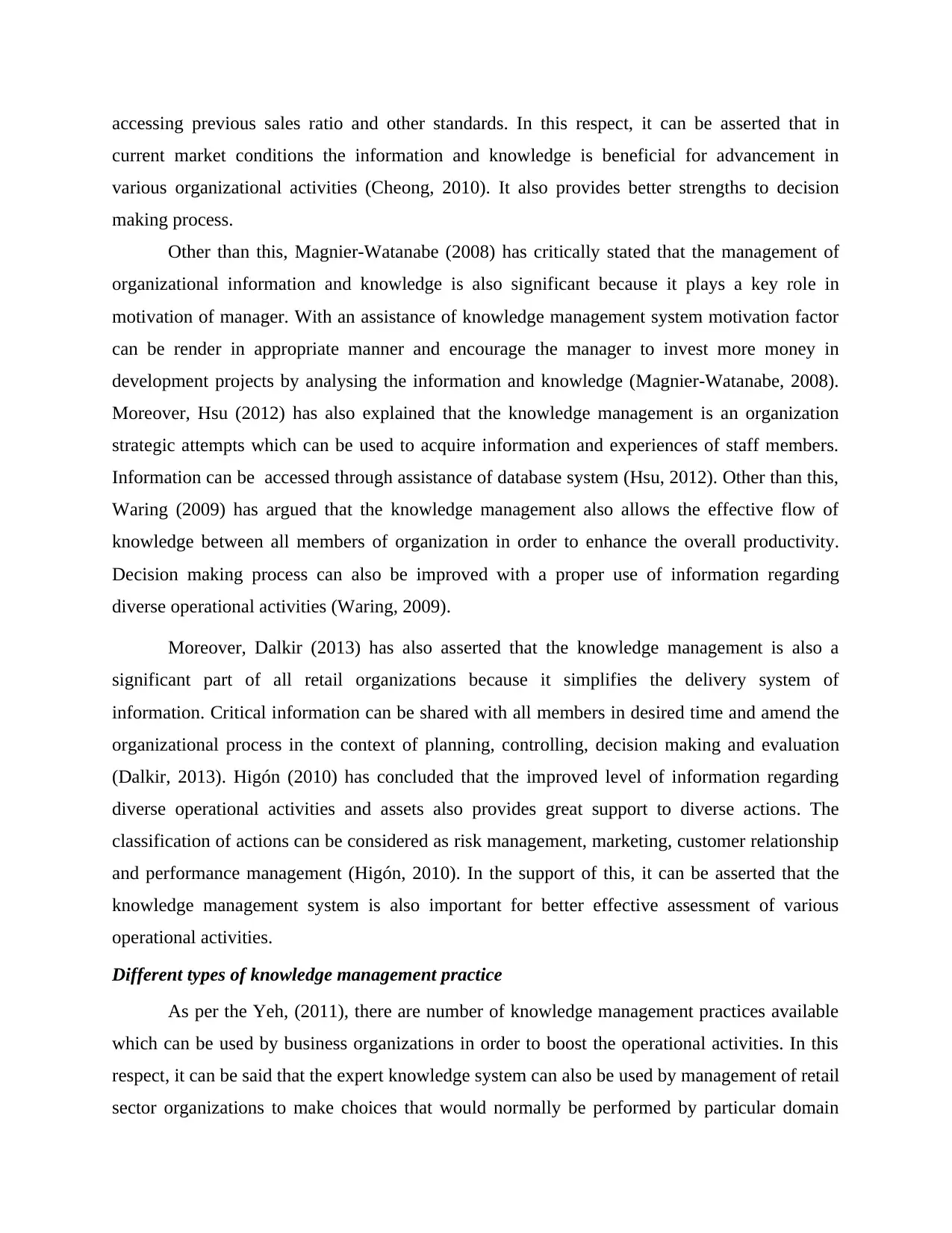
accessing previous sales ratio and other standards. In this respect, it can be asserted that in
current market conditions the information and knowledge is beneficial for advancement in
various organizational activities (Cheong, 2010). It also provides better strengths to decision
making process.
Other than this, Magnier-Watanabe (2008) has critically stated that the management of
organizational information and knowledge is also significant because it plays a key role in
motivation of manager. With an assistance of knowledge management system motivation factor
can be render in appropriate manner and encourage the manager to invest more money in
development projects by analysing the information and knowledge (Magnier-Watanabe, 2008).
Moreover, Hsu (2012) has also explained that the knowledge management is an organization
strategic attempts which can be used to acquire information and experiences of staff members.
Information can be accessed through assistance of database system (Hsu, 2012). Other than this,
Waring (2009) has argued that the knowledge management also allows the effective flow of
knowledge between all members of organization in order to enhance the overall productivity.
Decision making process can also be improved with a proper use of information regarding
diverse operational activities (Waring, 2009).
Moreover, Dalkir (2013) has also asserted that the knowledge management is also a
significant part of all retail organizations because it simplifies the delivery system of
information. Critical information can be shared with all members in desired time and amend the
organizational process in the context of planning, controlling, decision making and evaluation
(Dalkir, 2013). Higón (2010) has concluded that the improved level of information regarding
diverse operational activities and assets also provides great support to diverse actions. The
classification of actions can be considered as risk management, marketing, customer relationship
and performance management (Higón, 2010). In the support of this, it can be asserted that the
knowledge management system is also important for better effective assessment of various
operational activities.
Different types of knowledge management practice
As per the Yeh, (2011), there are number of knowledge management practices available
which can be used by business organizations in order to boost the operational activities. In this
respect, it can be said that the expert knowledge system can also be used by management of retail
sector organizations to make choices that would normally be performed by particular domain
current market conditions the information and knowledge is beneficial for advancement in
various organizational activities (Cheong, 2010). It also provides better strengths to decision
making process.
Other than this, Magnier-Watanabe (2008) has critically stated that the management of
organizational information and knowledge is also significant because it plays a key role in
motivation of manager. With an assistance of knowledge management system motivation factor
can be render in appropriate manner and encourage the manager to invest more money in
development projects by analysing the information and knowledge (Magnier-Watanabe, 2008).
Moreover, Hsu (2012) has also explained that the knowledge management is an organization
strategic attempts which can be used to acquire information and experiences of staff members.
Information can be accessed through assistance of database system (Hsu, 2012). Other than this,
Waring (2009) has argued that the knowledge management also allows the effective flow of
knowledge between all members of organization in order to enhance the overall productivity.
Decision making process can also be improved with a proper use of information regarding
diverse operational activities (Waring, 2009).
Moreover, Dalkir (2013) has also asserted that the knowledge management is also a
significant part of all retail organizations because it simplifies the delivery system of
information. Critical information can be shared with all members in desired time and amend the
organizational process in the context of planning, controlling, decision making and evaluation
(Dalkir, 2013). Higón (2010) has concluded that the improved level of information regarding
diverse operational activities and assets also provides great support to diverse actions. The
classification of actions can be considered as risk management, marketing, customer relationship
and performance management (Higón, 2010). In the support of this, it can be asserted that the
knowledge management system is also important for better effective assessment of various
operational activities.
Different types of knowledge management practice
As per the Yeh, (2011), there are number of knowledge management practices available
which can be used by business organizations in order to boost the operational activities. In this
respect, it can be said that the expert knowledge system can also be used by management of retail
sector organizations to make choices that would normally be performed by particular domain
⊘ This is a preview!⊘
Do you want full access?
Subscribe today to unlock all pages.

Trusted by 1+ million students worldwide
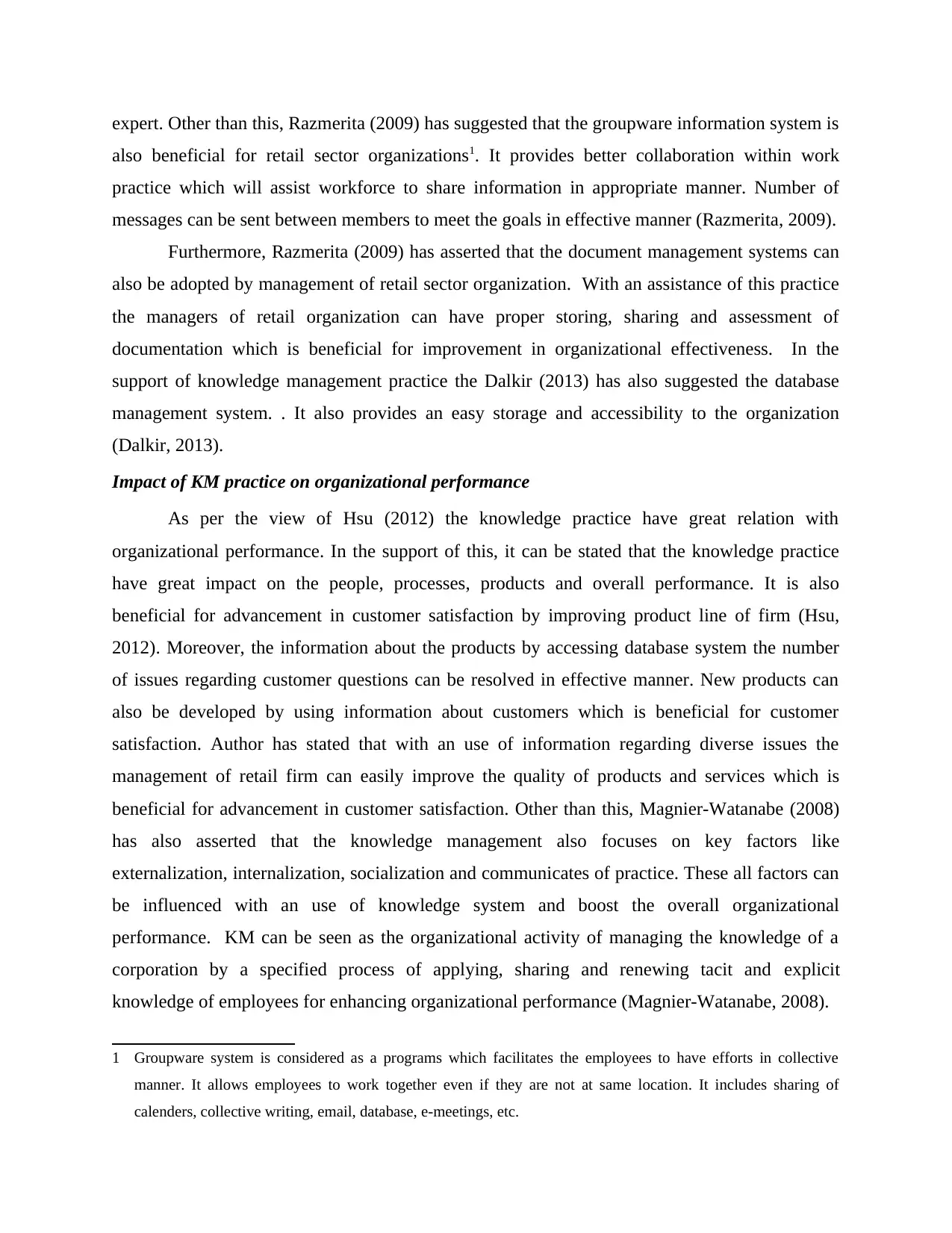
expert. Other than this, Razmerita (2009) has suggested that the groupware information system is
also beneficial for retail sector organizations1. It provides better collaboration within work
practice which will assist workforce to share information in appropriate manner. Number of
messages can be sent between members to meet the goals in effective manner (Razmerita, 2009).
Furthermore, Razmerita (2009) has asserted that the document management systems can
also be adopted by management of retail sector organization. With an assistance of this practice
the managers of retail organization can have proper storing, sharing and assessment of
documentation which is beneficial for improvement in organizational effectiveness. In the
support of knowledge management practice the Dalkir (2013) has also suggested the database
management system. . It also provides an easy storage and accessibility to the organization
(Dalkir, 2013).
Impact of KM practice on organizational performance
As per the view of Hsu (2012) the knowledge practice have great relation with
organizational performance. In the support of this, it can be stated that the knowledge practice
have great impact on the people, processes, products and overall performance. It is also
beneficial for advancement in customer satisfaction by improving product line of firm (Hsu,
2012). Moreover, the information about the products by accessing database system the number
of issues regarding customer questions can be resolved in effective manner. New products can
also be developed by using information about customers which is beneficial for customer
satisfaction. Author has stated that with an use of information regarding diverse issues the
management of retail firm can easily improve the quality of products and services which is
beneficial for advancement in customer satisfaction. Other than this, Magnier-Watanabe (2008)
has also asserted that the knowledge management also focuses on key factors like
externalization, internalization, socialization and communicates of practice. These all factors can
be influenced with an use of knowledge system and boost the overall organizational
performance. KM can be seen as the organizational activity of managing the knowledge of a
corporation by a specified process of applying, sharing and renewing tacit and explicit
knowledge of employees for enhancing organizational performance (Magnier-Watanabe, 2008).
1 Groupware system is considered as a programs which facilitates the employees to have efforts in collective
manner. It allows employees to work together even if they are not at same location. It includes sharing of
calenders, collective writing, email, database, e-meetings, etc.
also beneficial for retail sector organizations1. It provides better collaboration within work
practice which will assist workforce to share information in appropriate manner. Number of
messages can be sent between members to meet the goals in effective manner (Razmerita, 2009).
Furthermore, Razmerita (2009) has asserted that the document management systems can
also be adopted by management of retail sector organization. With an assistance of this practice
the managers of retail organization can have proper storing, sharing and assessment of
documentation which is beneficial for improvement in organizational effectiveness. In the
support of knowledge management practice the Dalkir (2013) has also suggested the database
management system. . It also provides an easy storage and accessibility to the organization
(Dalkir, 2013).
Impact of KM practice on organizational performance
As per the view of Hsu (2012) the knowledge practice have great relation with
organizational performance. In the support of this, it can be stated that the knowledge practice
have great impact on the people, processes, products and overall performance. It is also
beneficial for advancement in customer satisfaction by improving product line of firm (Hsu,
2012). Moreover, the information about the products by accessing database system the number
of issues regarding customer questions can be resolved in effective manner. New products can
also be developed by using information about customers which is beneficial for customer
satisfaction. Author has stated that with an use of information regarding diverse issues the
management of retail firm can easily improve the quality of products and services which is
beneficial for advancement in customer satisfaction. Other than this, Magnier-Watanabe (2008)
has also asserted that the knowledge management also focuses on key factors like
externalization, internalization, socialization and communicates of practice. These all factors can
be influenced with an use of knowledge system and boost the overall organizational
performance. KM can be seen as the organizational activity of managing the knowledge of a
corporation by a specified process of applying, sharing and renewing tacit and explicit
knowledge of employees for enhancing organizational performance (Magnier-Watanabe, 2008).
1 Groupware system is considered as a programs which facilitates the employees to have efforts in collective
manner. It allows employees to work together even if they are not at same location. It includes sharing of
calenders, collective writing, email, database, e-meetings, etc.
Paraphrase This Document
Need a fresh take? Get an instant paraphrase of this document with our AI Paraphraser
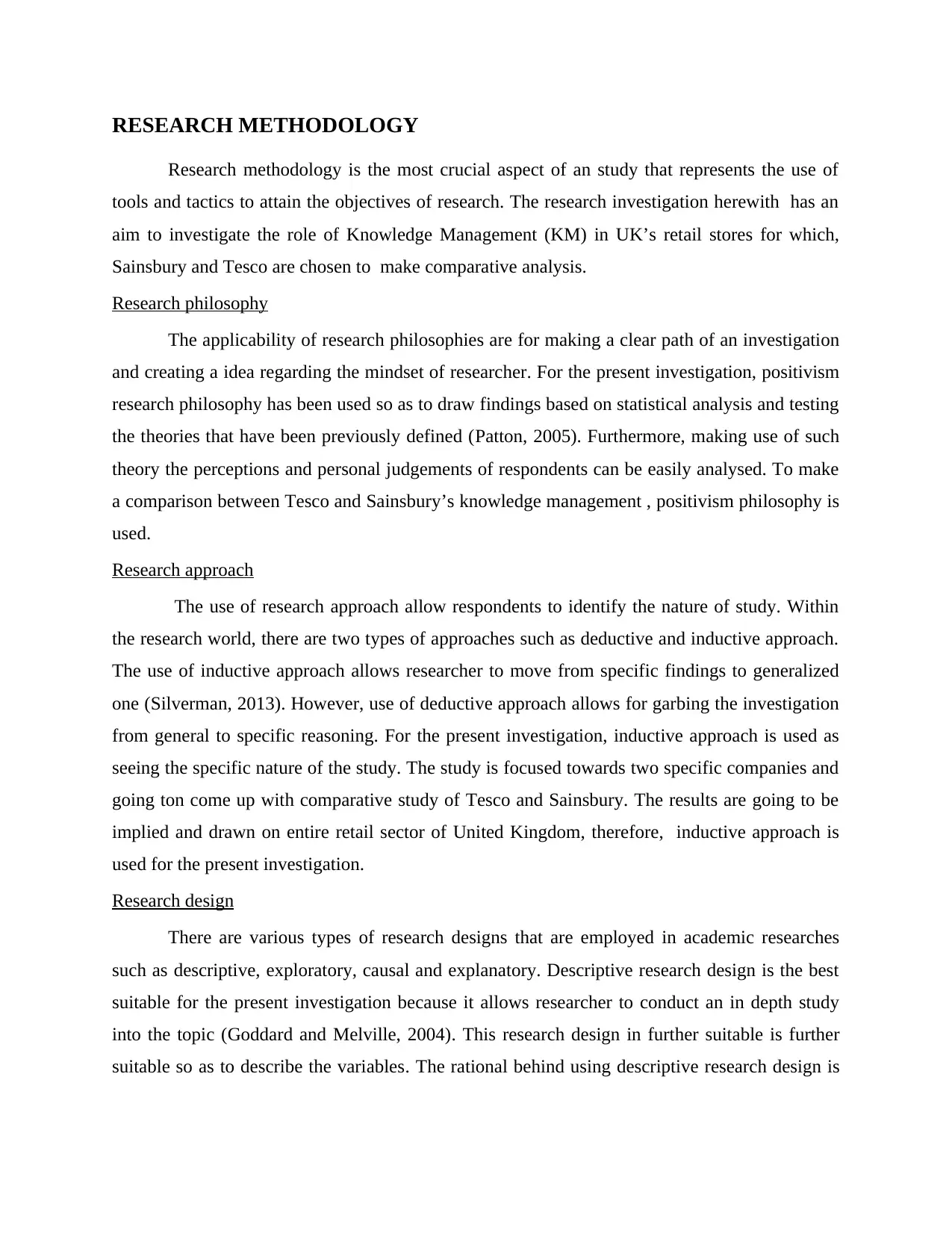
RESEARCH METHODOLOGY
Research methodology is the most crucial aspect of an study that represents the use of
tools and tactics to attain the objectives of research. The research investigation herewith has an
aim to investigate the role of Knowledge Management (KM) in UK’s retail stores for which,
Sainsbury and Tesco are chosen to make comparative analysis.
Research philosophy
The applicability of research philosophies are for making a clear path of an investigation
and creating a idea regarding the mindset of researcher. For the present investigation, positivism
research philosophy has been used so as to draw findings based on statistical analysis and testing
the theories that have been previously defined (Patton, 2005). Furthermore, making use of such
theory the perceptions and personal judgements of respondents can be easily analysed. To make
a comparison between Tesco and Sainsbury’s knowledge management , positivism philosophy is
used.
Research approach
The use of research approach allow respondents to identify the nature of study. Within
the research world, there are two types of approaches such as deductive and inductive approach.
The use of inductive approach allows researcher to move from specific findings to generalized
one (Silverman, 2013). However, use of deductive approach allows for garbing the investigation
from general to specific reasoning. For the present investigation, inductive approach is used as
seeing the specific nature of the study. The study is focused towards two specific companies and
going ton come up with comparative study of Tesco and Sainsbury. The results are going to be
implied and drawn on entire retail sector of United Kingdom, therefore, inductive approach is
used for the present investigation.
Research design
There are various types of research designs that are employed in academic researches
such as descriptive, exploratory, causal and explanatory. Descriptive research design is the best
suitable for the present investigation because it allows researcher to conduct an in depth study
into the topic (Goddard and Melville, 2004). This research design in further suitable is further
suitable so as to describe the variables. The rational behind using descriptive research design is
Research methodology is the most crucial aspect of an study that represents the use of
tools and tactics to attain the objectives of research. The research investigation herewith has an
aim to investigate the role of Knowledge Management (KM) in UK’s retail stores for which,
Sainsbury and Tesco are chosen to make comparative analysis.
Research philosophy
The applicability of research philosophies are for making a clear path of an investigation
and creating a idea regarding the mindset of researcher. For the present investigation, positivism
research philosophy has been used so as to draw findings based on statistical analysis and testing
the theories that have been previously defined (Patton, 2005). Furthermore, making use of such
theory the perceptions and personal judgements of respondents can be easily analysed. To make
a comparison between Tesco and Sainsbury’s knowledge management , positivism philosophy is
used.
Research approach
The use of research approach allow respondents to identify the nature of study. Within
the research world, there are two types of approaches such as deductive and inductive approach.
The use of inductive approach allows researcher to move from specific findings to generalized
one (Silverman, 2013). However, use of deductive approach allows for garbing the investigation
from general to specific reasoning. For the present investigation, inductive approach is used as
seeing the specific nature of the study. The study is focused towards two specific companies and
going ton come up with comparative study of Tesco and Sainsbury. The results are going to be
implied and drawn on entire retail sector of United Kingdom, therefore, inductive approach is
used for the present investigation.
Research design
There are various types of research designs that are employed in academic researches
such as descriptive, exploratory, causal and explanatory. Descriptive research design is the best
suitable for the present investigation because it allows researcher to conduct an in depth study
into the topic (Goddard and Melville, 2004). This research design in further suitable is further
suitable so as to describe the variables. The rational behind using descriptive research design is
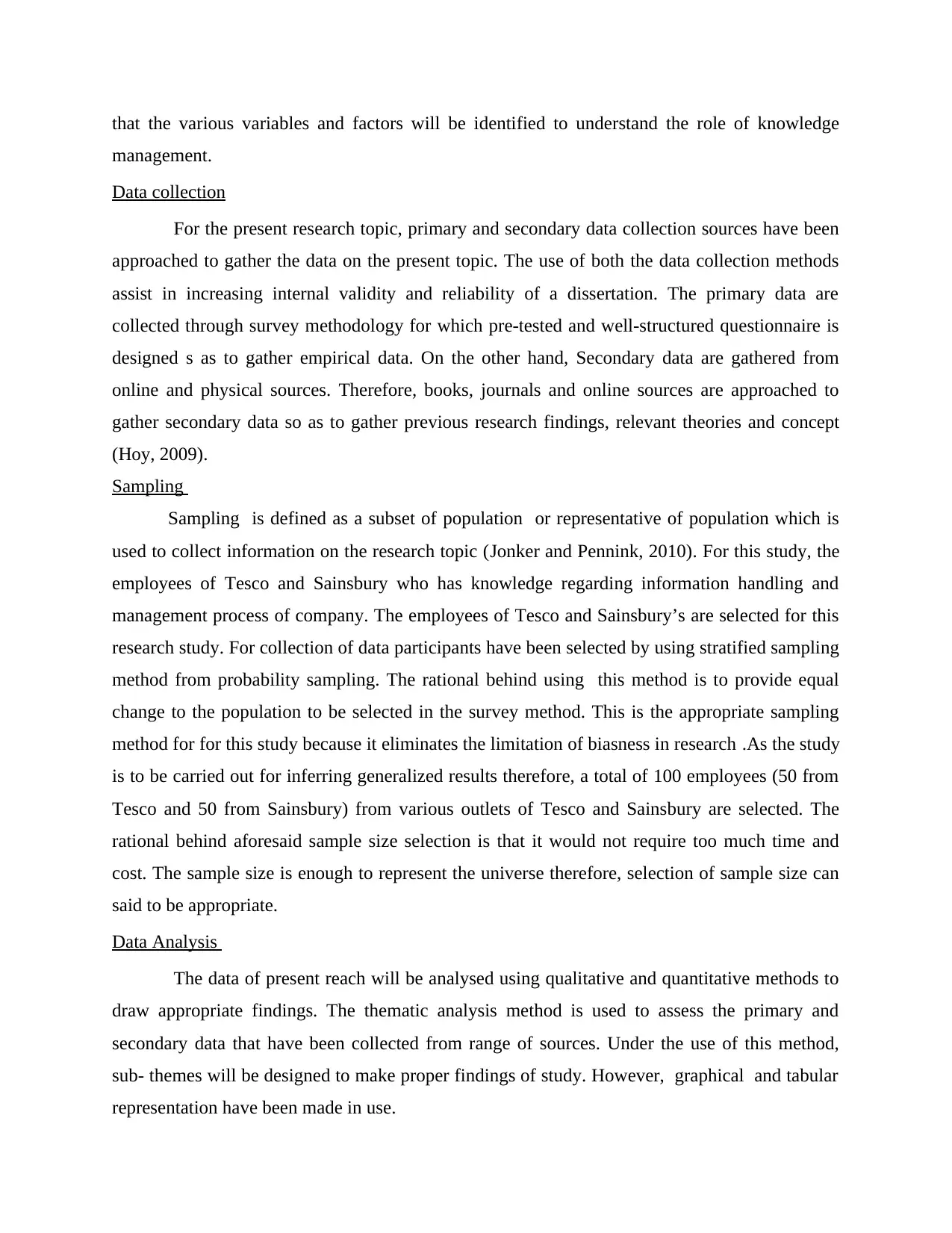
that the various variables and factors will be identified to understand the role of knowledge
management.
Data collection
For the present research topic, primary and secondary data collection sources have been
approached to gather the data on the present topic. The use of both the data collection methods
assist in increasing internal validity and reliability of a dissertation. The primary data are
collected through survey methodology for which pre-tested and well-structured questionnaire is
designed s as to gather empirical data. On the other hand, Secondary data are gathered from
online and physical sources. Therefore, books, journals and online sources are approached to
gather secondary data so as to gather previous research findings, relevant theories and concept
(Hoy, 2009).
Sampling
Sampling is defined as a subset of population or representative of population which is
used to collect information on the research topic (Jonker and Pennink, 2010). For this study, the
employees of Tesco and Sainsbury who has knowledge regarding information handling and
management process of company. The employees of Tesco and Sainsbury’s are selected for this
research study. For collection of data participants have been selected by using stratified sampling
method from probability sampling. The rational behind using this method is to provide equal
change to the population to be selected in the survey method. This is the appropriate sampling
method for for this study because it eliminates the limitation of biasness in research .As the study
is to be carried out for inferring generalized results therefore, a total of 100 employees (50 from
Tesco and 50 from Sainsbury) from various outlets of Tesco and Sainsbury are selected. The
rational behind aforesaid sample size selection is that it would not require too much time and
cost. The sample size is enough to represent the universe therefore, selection of sample size can
said to be appropriate.
Data Analysis
The data of present reach will be analysed using qualitative and quantitative methods to
draw appropriate findings. The thematic analysis method is used to assess the primary and
secondary data that have been collected from range of sources. Under the use of this method,
sub- themes will be designed to make proper findings of study. However, graphical and tabular
representation have been made in use.
management.
Data collection
For the present research topic, primary and secondary data collection sources have been
approached to gather the data on the present topic. The use of both the data collection methods
assist in increasing internal validity and reliability of a dissertation. The primary data are
collected through survey methodology for which pre-tested and well-structured questionnaire is
designed s as to gather empirical data. On the other hand, Secondary data are gathered from
online and physical sources. Therefore, books, journals and online sources are approached to
gather secondary data so as to gather previous research findings, relevant theories and concept
(Hoy, 2009).
Sampling
Sampling is defined as a subset of population or representative of population which is
used to collect information on the research topic (Jonker and Pennink, 2010). For this study, the
employees of Tesco and Sainsbury who has knowledge regarding information handling and
management process of company. The employees of Tesco and Sainsbury’s are selected for this
research study. For collection of data participants have been selected by using stratified sampling
method from probability sampling. The rational behind using this method is to provide equal
change to the population to be selected in the survey method. This is the appropriate sampling
method for for this study because it eliminates the limitation of biasness in research .As the study
is to be carried out for inferring generalized results therefore, a total of 100 employees (50 from
Tesco and 50 from Sainsbury) from various outlets of Tesco and Sainsbury are selected. The
rational behind aforesaid sample size selection is that it would not require too much time and
cost. The sample size is enough to represent the universe therefore, selection of sample size can
said to be appropriate.
Data Analysis
The data of present reach will be analysed using qualitative and quantitative methods to
draw appropriate findings. The thematic analysis method is used to assess the primary and
secondary data that have been collected from range of sources. Under the use of this method,
sub- themes will be designed to make proper findings of study. However, graphical and tabular
representation have been made in use.
⊘ This is a preview!⊘
Do you want full access?
Subscribe today to unlock all pages.

Trusted by 1+ million students worldwide
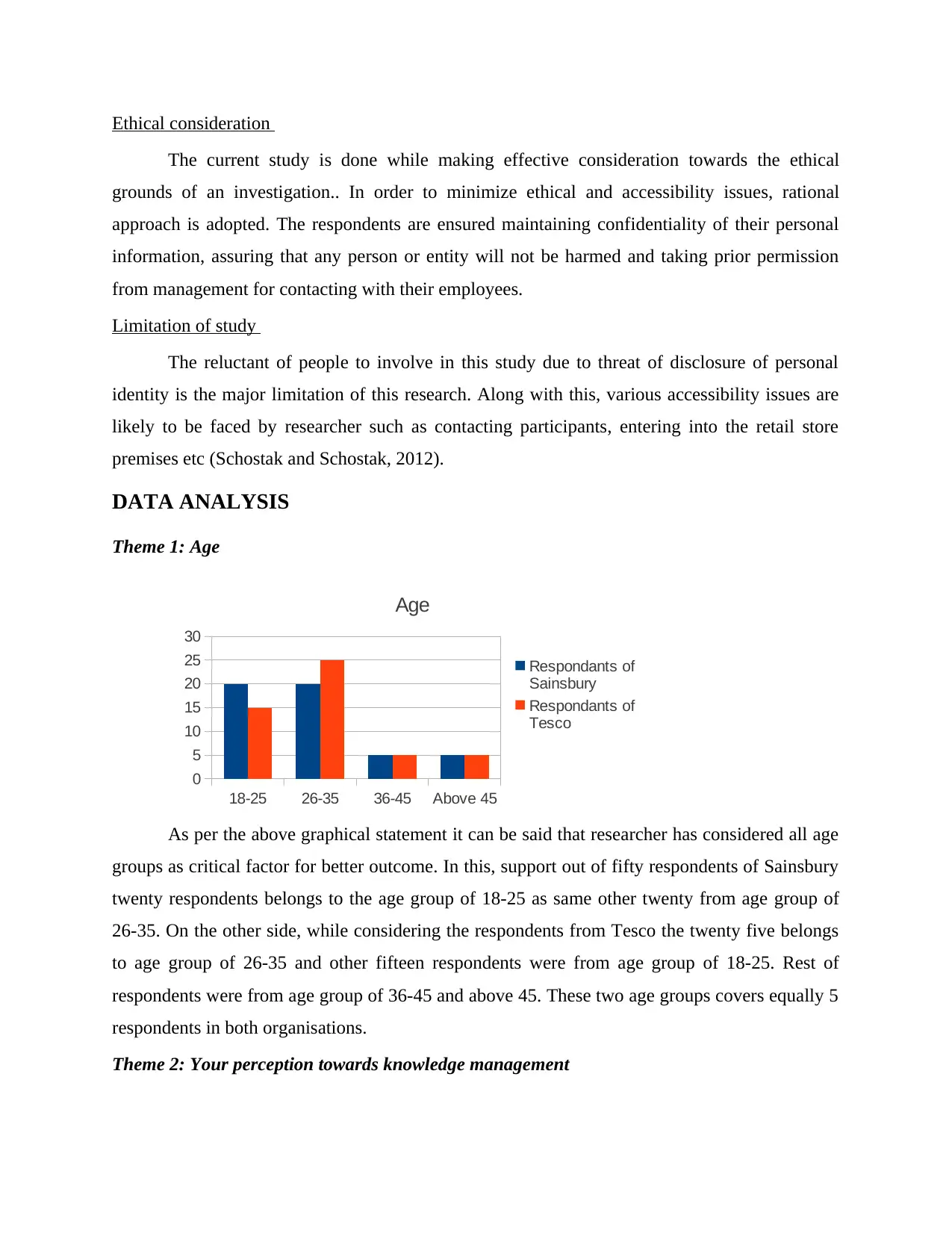
Ethical consideration
The current study is done while making effective consideration towards the ethical
grounds of an investigation.. In order to minimize ethical and accessibility issues, rational
approach is adopted. The respondents are ensured maintaining confidentiality of their personal
information, assuring that any person or entity will not be harmed and taking prior permission
from management for contacting with their employees.
Limitation of study
The reluctant of people to involve in this study due to threat of disclosure of personal
identity is the major limitation of this research. Along with this, various accessibility issues are
likely to be faced by researcher such as contacting participants, entering into the retail store
premises etc (Schostak and Schostak, 2012).
DATA ANALYSIS
Theme 1: Age
As per the above graphical statement it can be said that researcher has considered all age
groups as critical factor for better outcome. In this, support out of fifty respondents of Sainsbury
twenty respondents belongs to the age group of 18-25 as same other twenty from age group of
26-35. On the other side, while considering the respondents from Tesco the twenty five belongs
to age group of 26-35 and other fifteen respondents were from age group of 18-25. Rest of
respondents were from age group of 36-45 and above 45. These two age groups covers equally 5
respondents in both organisations.
Theme 2: Your perception towards knowledge management
18-25 26-35 36-45 Above 45
0
5
10
15
20
25
30
Age
Respondants of
Sainsbury
Respondants of
Tesco
The current study is done while making effective consideration towards the ethical
grounds of an investigation.. In order to minimize ethical and accessibility issues, rational
approach is adopted. The respondents are ensured maintaining confidentiality of their personal
information, assuring that any person or entity will not be harmed and taking prior permission
from management for contacting with their employees.
Limitation of study
The reluctant of people to involve in this study due to threat of disclosure of personal
identity is the major limitation of this research. Along with this, various accessibility issues are
likely to be faced by researcher such as contacting participants, entering into the retail store
premises etc (Schostak and Schostak, 2012).
DATA ANALYSIS
Theme 1: Age
As per the above graphical statement it can be said that researcher has considered all age
groups as critical factor for better outcome. In this, support out of fifty respondents of Sainsbury
twenty respondents belongs to the age group of 18-25 as same other twenty from age group of
26-35. On the other side, while considering the respondents from Tesco the twenty five belongs
to age group of 26-35 and other fifteen respondents were from age group of 18-25. Rest of
respondents were from age group of 36-45 and above 45. These two age groups covers equally 5
respondents in both organisations.
Theme 2: Your perception towards knowledge management
18-25 26-35 36-45 Above 45
0
5
10
15
20
25
30
Age
Respondants of
Sainsbury
Respondants of
Tesco
Paraphrase This Document
Need a fresh take? Get an instant paraphrase of this document with our AI Paraphraser
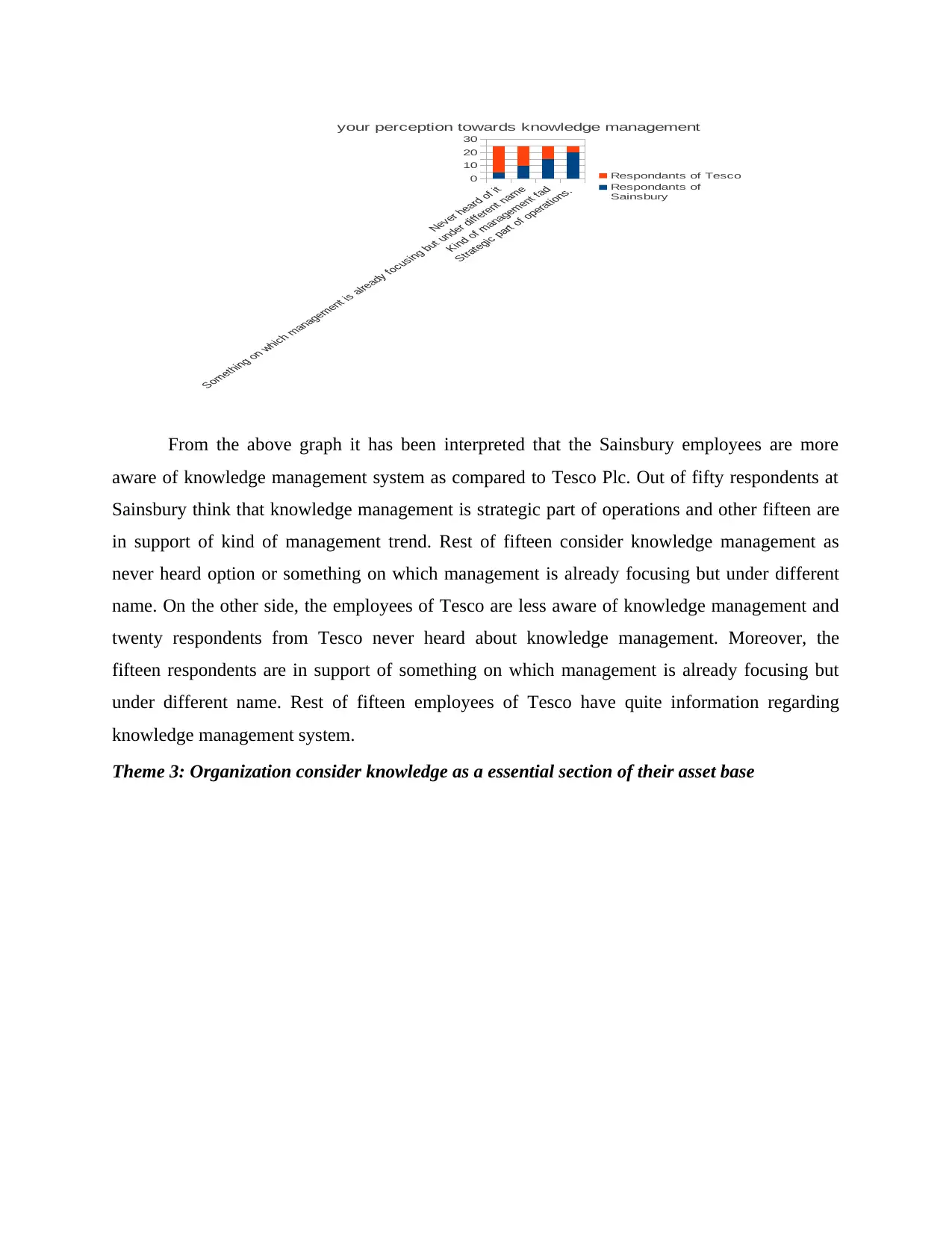
From the above graph it has been interpreted that the Sainsbury employees are more
aware of knowledge management system as compared to Tesco Plc. Out of fifty respondents at
Sainsbury think that knowledge management is strategic part of operations and other fifteen are
in support of kind of management trend. Rest of fifteen consider knowledge management as
never heard option or something on which management is already focusing but under different
name. On the other side, the employees of Tesco are less aware of knowledge management and
twenty respondents from Tesco never heard about knowledge management. Moreover, the
fifteen respondents are in support of something on which management is already focusing but
under different name. Rest of fifteen employees of Tesco have quite information regarding
knowledge management system.
Theme 3: Organization consider knowledge as a essential section of their asset base
0
10
20
30
your perception towards knowledge management
Respondants of Tesco
Respondants of
Sainsbury
aware of knowledge management system as compared to Tesco Plc. Out of fifty respondents at
Sainsbury think that knowledge management is strategic part of operations and other fifteen are
in support of kind of management trend. Rest of fifteen consider knowledge management as
never heard option or something on which management is already focusing but under different
name. On the other side, the employees of Tesco are less aware of knowledge management and
twenty respondents from Tesco never heard about knowledge management. Moreover, the
fifteen respondents are in support of something on which management is already focusing but
under different name. Rest of fifteen employees of Tesco have quite information regarding
knowledge management system.
Theme 3: Organization consider knowledge as a essential section of their asset base
0
10
20
30
your perception towards knowledge management
Respondants of Tesco
Respondants of
Sainsbury
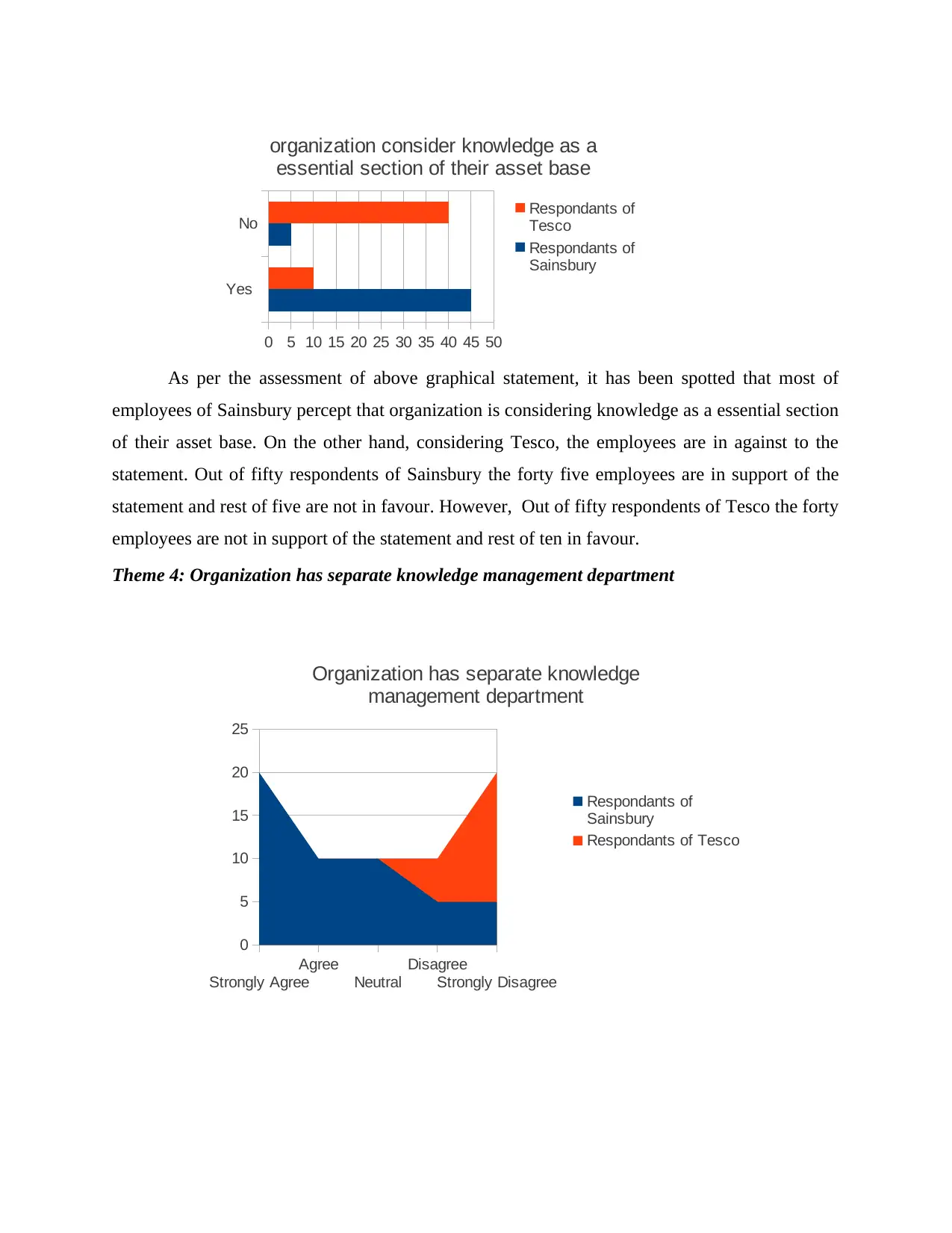
As per the assessment of above graphical statement, it has been spotted that most of
employees of Sainsbury percept that organization is considering knowledge as a essential section
of their asset base. On the other hand, considering Tesco, the employees are in against to the
statement. Out of fifty respondents of Sainsbury the forty five employees are in support of the
statement and rest of five are not in favour. However, Out of fifty respondents of Tesco the forty
employees are not in support of the statement and rest of ten in favour.
Theme 4: Organization has separate knowledge management department
Yes
No
0 5 10 15 20 25 30 35 40 45 50
organization consider knowledge as a
essential section of their asset base
Respondants of
Tesco
Respondants of
Sainsbury
Strongly Agree
Agree
Neutral
Disagree
Strongly Disagree
0
5
10
15
20
25
Organization has separate knowledge
management department
Respondants of
Sainsbury
Respondants of Tesco
employees of Sainsbury percept that organization is considering knowledge as a essential section
of their asset base. On the other hand, considering Tesco, the employees are in against to the
statement. Out of fifty respondents of Sainsbury the forty five employees are in support of the
statement and rest of five are not in favour. However, Out of fifty respondents of Tesco the forty
employees are not in support of the statement and rest of ten in favour.
Theme 4: Organization has separate knowledge management department
Yes
No
0 5 10 15 20 25 30 35 40 45 50
organization consider knowledge as a
essential section of their asset base
Respondants of
Tesco
Respondants of
Sainsbury
Strongly Agree
Agree
Neutral
Disagree
Strongly Disagree
0
5
10
15
20
25
Organization has separate knowledge
management department
Respondants of
Sainsbury
Respondants of Tesco
⊘ This is a preview!⊘
Do you want full access?
Subscribe today to unlock all pages.

Trusted by 1+ million students worldwide
1 out of 29
Related Documents
Your All-in-One AI-Powered Toolkit for Academic Success.
+13062052269
info@desklib.com
Available 24*7 on WhatsApp / Email
![[object Object]](/_next/static/media/star-bottom.7253800d.svg)
Unlock your academic potential
Copyright © 2020–2025 A2Z Services. All Rights Reserved. Developed and managed by ZUCOL.





